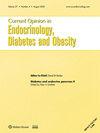Type 2 diabetes mellitus and cognitive function: understanding the connections.
IF 2.6
3区 医学
Q3 ENDOCRINOLOGY & METABOLISM
Current Opinion in Endocrinology & Diabetes and Obesity
Pub Date : 2023-02-01
DOI:10.1097/MED.0000000000000783
引用次数: 6
Abstract
Purpose of review To review the connection between type 2 diabetes and cognitive dysfunction, including its epidemiology, potential mechanisms of pathophysiology, risk factors, possible prevention, and treatment considerations. Recent findings Diabetes is a risk factor for mild cognitive decline, in addition to Alzheimer's disease and vascular dementia. Duration of diabetes, concomitant vascular or associated co-morbidities, hyper- and hypoglycemia may lead to worsening cognitive dysfunction. Unfortunately, there is a lack of evidence-based guidance on the prevention of cognitive dysfunction in the diabetes population. Studies of diabetes medications, including metformin, glucagon-like peptide-1 (GLP-1) receptor agonists, and sodium-glucose cotransporter-2 inhibitors (SGLT2) have shown some benefit with cardiovascular morbidity and may affect cognition. In the absence of clearly defined preventive tools, diabetes practice guidelines recommend annual cognitive screening as standard of care in adults with diabetes aged 65 years or older. Summary People living with diabetes are at risk for significant decline in cognitive function. Epidemiology and risk factors are well defined. Prevention and treatment strategies are limited and require further study.2型糖尿病与认知功能的关系
综述目的:综述2型糖尿病与认知功能障碍之间的关系,包括其流行病学、潜在的病理生理机制、危险因素、可能的预防和治疗注意事项。最近的研究发现:除了阿尔茨海默病和血管性痴呆之外,糖尿病也是轻度认知能力下降的一个危险因素。糖尿病的持续时间、伴随的血管或相关的合并症、高血糖和低血糖都可能导致认知功能障碍的恶化。不幸的是,在糖尿病人群中预防认知功能障碍方面缺乏循证指导。包括二甲双胍、胰高血糖素样肽-1 (GLP-1)受体激动剂和钠-葡萄糖共转运蛋白-2抑制剂(SGLT2)在内的糖尿病药物研究显示,它们对心血管疾病有一定的益处,并可能影响认知。在缺乏明确定义的预防工具的情况下,糖尿病实践指南建议将年度认知筛查作为65岁或以上糖尿病成人患者的标准护理。总结:糖尿病患者有认知功能显著下降的风险。流行病学和危险因素都有明确的定义。预防和治疗策略是有限的,需要进一步研究。
本文章由计算机程序翻译,如有差异,请以英文原文为准。
求助全文
约1分钟内获得全文
求助全文
来源期刊

Current Opinion in Endocrinology & Diabetes and Obesity
ENDOCRINOLOGY & METABOLISM-
CiteScore
5.80
自引率
3.10%
发文量
128
审稿时长
6-12 weeks
期刊介绍:
Current Opinion in Endocrinology, Diabetes and Obesity delivers a broad-based perspective on the most recent and exciting developments in the field from across the world. Published bimonthly and featuring twelve key topics – including androgens, gastrointestinal hormones, diabetes and the endocrine pancreas, and neuroendocrinology – the journal’s renowned team of guest editors ensure a balanced, expert assessment of the recently published literature in each respective field with insightful editorials and on-the-mark invited reviews.
 求助内容:
求助内容: 应助结果提醒方式:
应助结果提醒方式:


